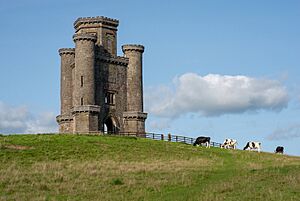Paxton's Tower facts for kids
Paxton's Tower is a cool old building that looks like a castle tower. It's called a "folly" because it was built just for fun and to look nice, not for defense. This special tower was built to honor Lord Nelson, a famous British naval hero. You can find it on a hill near Llanarthney in the beautiful River Tywi valley in Carmarthenshire, Wales.
It's a great place to visit, especially if you're also going to the National Botanic Garden of Wales nearby. From the tower, you get amazing views of the Botanic Gardens and the whole Tywi valley. This tower is so important that it's a "Grade II* listed building," which means it's protected because of its special history and architecture. The National Trust takes care of it.
Contents
Who Built Paxton's Tower?
The tower was built by a man named Sir William Paxton. He was born in Scotland in 1745 and grew up in London. Sir William was a very successful merchant and banker. He made a lot of money working with the East India Company in India.
He bought the Middleton Hall estate around 1790. This is where the tower stands today.
When Was the Tower Built?
Paxton's Tower was built between 1806 and 1809. Sir William Paxton might have decided to build it after Lord Nelson died. Nelson was a hero at the Battle of Trafalgar.
It's possible that Sir William Paxton even met Lord Nelson. This might have happened when Paxton was the mayor of Carmarthen. Marble plaques honoring Nelson were placed above the tower's entrances.
What Was Middleton Hall?
Middleton Hall was a large house designed by an architect named Samuel Pepys Cockerell. It was the main building on Sir William Paxton's estate. Sadly, Middleton Hall was destroyed by a fire in 1931.
How Was the Tower Built?
The tower stands about 36 feet (11 meters) tall. The bottom part of the tower has a triangular shape. There's a small turret, like a mini-tower, at each of its three corners.
Inside the Tower
On the first floor, there is a special room called a banqueting room. This was likely used for parties or fancy dinners. Some colored glass from one of its windows is now in the Carmarthen Museum. You can see it in Abergwili.
Above the banqueting room, on the second floor, is a hexagonal room. This means it has six sides. It was a "prospect room," designed for looking out at the views. This room used to have roof terraces all around it. The windows of this room are now bricked up.
You can still go inside the tower today! Public access is allowed to the first-floor banqueting room. You get there by climbing stairs inside one of the corner turrets.
The "Pi" Sculpture
Near Paxton's Tower, in the National Botanic Garden of Wales, there's a spot called Paxton's View. This area offers great views of the tower. Here, you'll find a cool sculpture called "Pi."
The sculpture was made by an artist named Rawleigh Clay. It's a large metal hoop with a twisted wooden structure on top. The hoop is placed so that it perfectly "frames" the view of Paxton's Tower. It's like a special viewing circle just for the tower!
 | Claudette Colvin |
 | Myrlie Evers-Williams |
 | Alberta Odell Jones |


